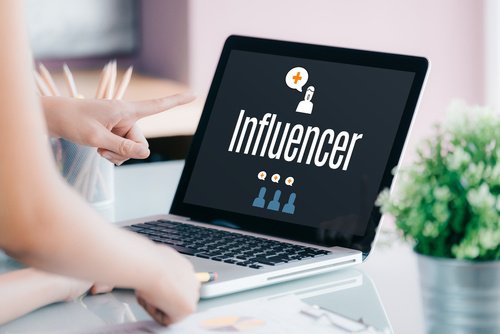
The advent of the internet has had a seismic impact on b2b sales and marketing, dramatically changing the buyer’s journey. Gone are the days when sales executives directed the buying process, determining what information was presented to audiences, when and how. Today’s buyer is in control of their journey.
Savvy consumers increasingly tune out conventional advertising (e.g., TV commercials, radio spots, and online ads), opting, instead, for endorsements by respected individuals that feel more authentic. B2C brands are enjoying impressive results from influencer marketing (some reports cite twice as many conversions and more than six times as much website traffic as conventional advertising efforts).
Fashion and beauty icon, Kim Kardashian is the most important and powerful influencer in the world. Her reach extends far beyond her brands; whenever she wears, posts about, or refers to a fashion brand, there is an immediate and substantial increase in both brand awareness and sales. An influencer with a large Snapchat or Instagram following usually doesn’t have much credibility with B2B buyers; however, there’s no reason these metrics shouldn’t apply in the B2B brand space.
Although though social media has accelerated the b2b sales cycle, it’s still much longer than the cycle for consumer products. B2B buyers can get as far as two-thirds through the purchase journey before they contact a vendor, and that’s only if the vendor’s capability meets the fundamental technical requirements.
B2b decision-makers are well-educated, sophisticated, and skeptical about sales and marketing and, unfortunately, reaching them isn’t easy. Influencer marketing is a powerful way to raise brand awareness and establish credibility quicker and, ultimately, expedite generating sales. With these expected payoffs, it’s unquestionably worth the effort for b2b CMOs to start experimenting with influencer marketing.
Finding potential influencers for your brand
A sensible place to start is an online search to see who is trending on key topics relevant to your brand. To determine if an individual is considered a subject-matter expert, examine their social media following–Twitter, LinkedIn, Facebook and even Instagram and Snapchat. Then look for blogs, podcasts and videos they have created or participated in; these will help you understand the individual and whether they will be a good match for your brand.
But don’t limit your search to social media professionals. Also look where one traditionally finds experts—at universities, trade and industry associations, journalists, and authors.
Consider the 4 “Rs”
Regrettably, many b2b marketers use just one data point—reach—to determine which group of influencers to engage with. While reach is a reliable metric, it’s not the only one. As brand strategy consulting professionals, we advise considering the following:
- Reach: How large is their social community across all digital channels — blogs, RSS subscribers, contributed posts, social? Reach is important because it ensures that influencers can actually get content in their followers’ feeds.
- Relevance: How often are they referencing topics and keywords that align with your brand or describe your industry? Relevance will confirm that the influencer is “on topic” frequently and didn’t just engage six months ago and then leave the conversation.
- Resonance: Are others engaging with their content online? This metric helps differentiate real influencers from those with just large audiences but no engagement. And, equally as important, the ones that resort to shady tactics that make them appear more influential than they truly are.
- Reference: Do other influencers reference them? In other words, is their content shared, commented on, liked, or retweeted?
Once you understand your particular audience and realize what your marketing goals are for influencers, you’ll want to spend considerable time researching the ones that can drive the most impact for your brand.
Recent Posts
Posts by Topics
- Brand Strategy (57)
- Brand Strategy Consulting (28)
- Brand Differentiation (27)
- Customer Experience (24)
- Brand Positioning (22)
- Marketing Strategy (9)
- Brand Extension Strategy (8)
- Customer Behavior (8)
- Brand Architecture Strategy (7)
- Brand Extension (7)
- Brand Growth (7)
- Brand Portfolio & Architecture (7)
- Brand Purpose (7)
- Brand Value Proposition (7)
- Brand Engagement (6)
- Brand Portfolio Strategy (6)
- Brand Storytelling (6)
- Rebranding Strategy (6)
- Brand Awareness (5)
- Brand Image (5)
- Branding (5)
- Rebranding (5)
- Technology (5)
- B2B Brand Strategy (4)
- Brand Experience (4)
- Value Proposition (4)
- Brand Extendibility (3)
- Brand Metrics (3)
- Brand Repositioning (3)
- Corporate Branding (3)
- Differentiation Strategy (3)
- Measurement & Metrics (3)
- Brand Engagement Strategy (2)
- Brand Portfolio (2)
- Brand Promise (2)
- Brand Voice (2)
- Digital Marketing (2)
- Digital and Brand Experience (2)
- Employee Brand Engagement (2)
- Brand Architecture (1)
- Brand Development (1)
- Brand Equity (1)
- Brand Identity (1)
- Brand Measurement (1)
- Brand Name (1)
- Brand Strategy Consultants (1)
- Brand Strategy Firms (1)
- Digital Strategy (1)
- Internal Branding (1)
- Messaging (1)


